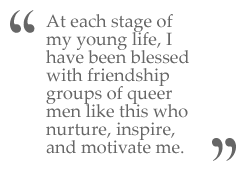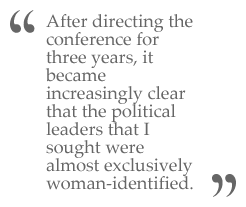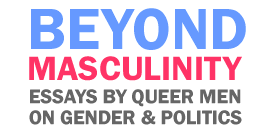It was only through the
company of other faggots in Chapel Hill that I was able
to deal with Joe’s jarring attack. I stumbled upon my
new posse of homos at the local coffee shop on a
particularly slow evening in September. A boy named
Andre quietly passed me a note that read in jagged
handwriting, “Power House – You know.” I didn’t
“know,” but I was quickly whisked 10 miles away to the
Waffle House in Durham with Andre and two of his
friends. They had officially invited me into what would
soon become my new queer family in Chapel Hill. After a
sweaty night of dancing and debauchery at the gay bar,
we’d head over to the sleazy 24-hour eatery with a
laptop, order greasy food and coffee, and sing songs by
Fiona Apple, Whitney Houston, or perhaps even a tune
from the musical Rent.
 At each stage of my
young life, I have been blessed with friendship groups
of queer men like this who nurture, inspire, and
motivate me. While not all of these men have necessarily
been a caricature of femininity, we have all dabbled in
the art of camp together to create a kind of collective
identity. All of us had struggled as outsiders in a
culture obsessed with an image of masculinity that we
did not resemble. Being in the South only exacerbated
this feeling of alienation.
At each stage of my
young life, I have been blessed with friendship groups
of queer men like this who nurture, inspire, and
motivate me. While not all of these men have necessarily
been a caricature of femininity, we have all dabbled in
the art of camp together to create a kind of collective
identity. All of us had struggled as outsiders in a
culture obsessed with an image of masculinity that we
did not resemble. Being in the South only exacerbated
this feeling of alienation.
It was this feeling of
alienation that facilitated coming into my political
consciousness. Growing up in a household rife with “GOP”
political commentary (my father would insist on making
us listen to conservative talk radio on family road
trips) had, early on, familiarized me with the kind of
inflammatory rhetoric that is 21st century
American politics. I launched my career in activism in
high school, when I directed and performed in a Broadway
Revue with a group of my theatre friends that raised
nearly $1000 for the International AIDS Vaccine
Initiative. In a North Carolina public school, AIDS was
the closest I could come to doing anything in the realm
of queer activism. It was also something of a slap in
the face to my high school, where I was the only openly
queer person.
It wasn’t until college,
however, that I really began to find an intellectual
space to challenge the culture that I had always viewed
with suspicion (and, likewise, that had always viewed me
with a healthy dose of suspicion). Though I was lucky
enough to have a US History teacher in high school who
assigned Howard Zinn’s The People’s History of the
United States, the vast majority of my teachers
never asked us critically examine American history or,
for that matter, American culture. Not even the local
LGBTQ youth group asked these kinds of questions,
settling for just making sure we didn’t get AIDS or kill
ourselves.
My professors in
college, on the other hand, demanded that I do so. I was
particularly drawn to feminist critiques of culture for
the way that they challenged norms of gender. I had a
lifetime in training in understanding the grave
shortcomings of the gender binary. Women’s Studies
classes with professors like Sherryl Kleinman, Karen
Booth, and Pamela Conover, all gave me new critical
tools with which I was able to build a queer political
consciousness. We read from authors like Suzanne Pharr,
who eloquently made clear the links between homophobia
and sexism, and Kate Bornstein, who has with great wit
and humor made the case for actively disrupting the
notion of the gender binary. Women’s Studies was the
only academic space at UNC in which I could have these
kinds of conversations.
With a foundation in
feminist analyses of gender, critically examining how
race and class structure our world was made easier. My
experiences in the predominately white program in middle
school had already primed me to understand the kinds of
privileges that came with my white skin and wealth.
Feminist critiques of race and class from folks like
bell hooks and Patricia Hill Collins challenged me to
more closely examine how my skin color and class had
lubricated my movement through life. I was called to ask
questions about my life and American culture that I had
never before considered.
It was with this
understanding of identity that I eagerly founded the
Unity Conference at UNC-Chapel Hill during my sophomore
year. I wanted to put together a program that would
explore where sexuality and gender identity intersected
with other kinds of identities like race, class,
ability, and age. I searched for speakers who could make
those links evident – from the Black lesbian activist
Mandy Carter to the wonderfully theatrical activist and
performer Nomi Lamm. I also looked for inspiring
political thinkers who could help inspire political
action, like former National Gay and Lesbian Task Force
director Urvashi Vaid, who keynoted the first
conference.
 After directing the
conference for three years, it became increasingly clear
that the political leaders that I sought were almost
exclusively woman-identified. During my junior year at
UNC, I wrote an editorial for the campus queer magazine,
LAMBDA, expressing my frustrations in finding
queer male mentors. It was appropriately titled “Where
the hell are all the feminist queer men?” While feminist
women had certainly given me the tools to understand my
own life as an effeminate queer man, I was finding few
resources from other men who shared my experiences and
politics.
After directing the
conference for three years, it became increasingly clear
that the political leaders that I sought were almost
exclusively woman-identified. During my junior year at
UNC, I wrote an editorial for the campus queer magazine,
LAMBDA, expressing my frustrations in finding
queer male mentors. It was appropriately titled “Where
the hell are all the feminist queer men?” While feminist
women had certainly given me the tools to understand my
own life as an effeminate queer man, I was finding few
resources from other men who shared my experiences and
politics.
At the same time, I
found myself more and more disillusioned with the
national LGBTQ movement that, it seemed, was less and
less interested in radical change. I spent a summer in
Boston working for one of those national organizations,
hoping to find a movement that made room for all kinds
of queer people. Instead, I found myself in big-shot
meetings of Boston’s major LGBTQ nonprofits that were
focused on planning events that highlighted the
experiences of those who were more “marketable,” while
desperately trying to keep the rest of us out of the
photo album... (continue reading)




16 COMMENTS ON THIS ESSAY:
"Gender, at least as it is currently understood, makes free expression nothing short of impossible – for all of us."
WOW!! This line struck me more than anything-- and there was a lot about this essay that I really connected with. I think that even within the gay community, gender plays a terrible constricting role. Your examples of the Boston "bigwigs" who wanted to parade out the "acceptable" homosexuals is one way this plays out within our community.
With this project, and your writing, I'd say you are well on your way toward becoming a role-model and opinion leader for gay men, much in the grain of Eric Rofes. Sullivan, Savage, and the Queer Eye Cast don't got nothing on you, honey!!
Jason -- thank you for your kind words :)
beautiful essay.
I'm an MTF transsexual, and I live in the Philippines, so I can't say that I identify 100% with the experiences that you'e described. Still, the article is touching, and it is scarily illuminating: much of the gay culture that I've come into contact with seems all to eager to shun minorities within the subgroup that are "embarassing" or "contrary to the cause".
I loved it, keep up the good work : )
What you wrote was interesting but I really don't get what you plan on doing with your life. This and trevorhoppe.com seem more like a hobby than anything else. I would assume your are living off of your parents money to fund everything. I don't see what purpose any of this serves. Sure growing up gay is difficult. It's not accepted as normal anywhere in the world. I know it is normal because i'm gay. You have to learn some things on your own.You are feminine and so are a lot of other guys but there is not as far as I know any reason to study it. Thats what gaydar is you can pick out some hint of being feminine. What difference does being gay have to do with anything anyway? It's who you like to be with or have sex with. Try getting a job where you need to work for a year and them write about how a rich kid actually worked for a year. Paris Hilton you aren't.
Trevor,
You have impressed me greatly. Who would have ever thought after our first one or two meetings we'd still be in communication.
Although I know you think I'm the most egocentric person you ever have met, I foresee great promise and future in all of your endeavors.
You're a great man Charlie Brown. Please keep me informed of any and all published work you have forthcoming, I truly enjoy reading it all.
I miss our fights and those long lectures.... Don't tell anyone, but I may not vote R this time...
Hope you and your family are all well.
Much Love,
Burge
This is great, I loved it. It captured something I really regret about my own life - hardening up, developing sharp edges, and feeling ashamed of the gentle self I was as a child.
I'm interested as well by the response of the commenter Jeremy (above, 1 Sep 08), as it reminds me of responses to my own work on sexual racism. It seems quite strained as he labours to construct a class difference he can invoke as a reason to hate 'on' you. He really, really doesn't want anyone to ask these questions, does he? For some, the indeterminacy that we've learned to cherish is a frightening place they're keen to leave as far behind them as possible.
Daniel -- Yes, the comment from Jeremy is disingenuous at best. He makes some big assumptions about me and my life, without hesitation. I guess I never responded out of some shame that I am an academic, and a recognition that that comes out of a place of privilege. I'm not sure when the idea came around that arguments from anyone with privilege are worthless, but its surely pervasive in feminist / queer / anti-academic circles (those are separate but overlapping spheres). But one thing is clear: he had no interest in engaging the arguments, and instead decided to write a hit piece on me. That's all too often how we engage.
Hi Trevor,
That was a very eloquent essay and I was truly touched by it. Although my experiences so far in life have been very different from yours--I'm a young woman who has grown up in very open-minded communities in the North and who now identifies as "interested in people" (what most people would call bisexual)--you articulated a lot of things that have been on my mind recently and that I've discussed and tried to express with my friends. Thank you for giving my feelings words.
I just found this website and I really like the essays and messages. Good luck with everything you do in the future.
Thanks, Tamar! I hope you enjoy the other essays in the collection! And please do spread the word! xoxo
Amongst other things, as someone formally interested in web design, I wanted to say how wonderful the design of this website is. It reminds me of google in its concept- clear, clean, simple, effective, accessable- which makes it all the more beautiful. The one thing I would suggest though is that the essays themselves are inside an iframe, as to reduce loading time.
I have a slightly different interpretation of those days. However, it was interesting to read about how you perceived who I was. Your perception is very valid and made me giggle, though I feel it paints a picture that is not all that close to my actual reality at the time. Not to say that I wasn't going through similar hardship, but I think I was coming from a very different place and I took a very different path. I haven't finished the article, busy trying to memorize music, but I will finish it soon and would like to talk about this later. Cheers!
Paolo
I thoroughly enjoyed this great essay. Perhaps this is a cheap point, but it reminded me of the pain and humiliation individuals face when they fall outside of gender boundaries. It's those individuals I need to be fighting for, even more so than myself.
As an 18-year-old feminine transgender man who's interested in activism and the intersections of oppressions, I'm having a hard time finding inspiring queer male role models who critique society in the way that you do. This site--and your fantastic essay--makes me hopeful. Thank you.
Aw thanks Oliver :) I'm glad you're finding the collection useful! xoxo
Trevor, wonderful piece! You are a brilliant writer with a great voice. I agree with your closing comments that as the more extreme forms of homophobia shift to the background of our culture, they have a disproportionate impact on poorer and more rural gay populations. You are right on in your fear that the big cities may become complacent and less likely to shake the status quo. But why the attacks on Dan Savage and Andrew Sullivan? Aren't they good examples of queer, "out-there" people who are fighting for gay marriage, comprehensive sex education, and acceptance for gay youth via the "It Gets Better Project". I wouldn't paint them with the same heteronormative brush just because they've gone mainstream, they still have a lot to offer to the conversation on gender and sexual equality.
Hey David, thanks for your comment. I've mellowed out a bit politically since writing this piece. But Dan Savage I think has really repugnant politics when it comes to deviant sex, and it frustrates me. The "It Gets Better" campaign was pretty incredible - though I'd like to see half that energy put into actually getting legislation changed. But I understand that cultural campaigns like that can often have powerful effects, sometimes moreso than legal change.
Andrew Sullivan has all but repented for his neoconservative years. The work he's been doing on immigration equality has been tremendous.
Anyways, glad you've enjoyed the piece. Hope you enjoyed other ones here! xoxo